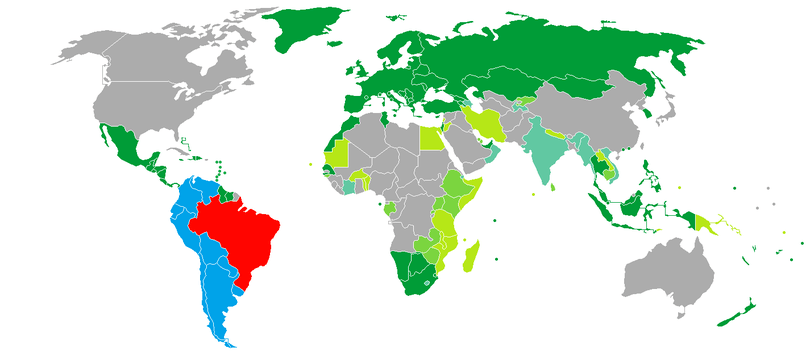Brazilian nationality law
| Brazil Citizenship Act | |
|---|---|
 | |
| Parliament of Brazil | |
| An Act relating to Brazilian citizenship | |
| Enacted by | Government of Brazil |
| Status: Current legislation | |
Brazilian nationality law is based on both the principles of jus soli and of jus sanguinis. As a general rule, any person born in Brazil acquires Brazilian nationality at birth, irrespective of status of parents. Nationality law is regulated by Article 12 of the Brazilian Federal Constitution.
Birth in Brazil
A person born in Brazil acquires Brazilian nationality at birth. The only exception applies to children of persons in the service of a foreign government (such as a foreign diplomats). This means that parents and siblings of the Brazilian child are eligible to apply for permanent residency in Brazil, regardless of their nationality or where subsequent siblings were/are born.[1]
Natural Brazilians born abroad
Brazilian law considers as Brazilian citizens people born abroad in two cases:
- a person born outside Brazil of a Brazilian parent who is in the service of the Brazilian government; or
- a person born outside Brazil of a Brazilian parent, provided that that person either be registered with a Brazilian consular office or later move to Brazil and confirm one's nationality before a federal judge.
Between 1994 and 2007, registration with a Brazilian consular office did not confer Brazilian nationality. In September 2007, a constitutional amendment reinstituted consular registration as a means of acquiring Brazilian nationality.
Naturalization as a Brazilian citizen
Foreigners may apply for Brazilian nationality if they meet the following criteria:[2][3][4]
- four years of residence in Brazil
- adequate ability to communicate in Portuguese
- no prior criminal conviction in either Brazil or any country that Brazil has formal relations with
The residence requirement may be reduced in certain circumstances:[2][3][4]
- only two years of residence are required for those who have provided "relevant services" to the country, or for those with notable "professional, scientific or artistic ability".
- only one year of residence is required for those who have a Brazilian spouse or child, of for nationals of Portuguese-speaking countries.
- no residence period is required for those married to a Brazilian diplomat for more than five years, or for those who worked for more than 10 years in a Brazilian diplomatic mission
Those who have lived in Brazil for more than 15 years and have no criminal conviction do not have to satisfy any other condition for naturalization. There are also lower requirements for those who moved to Brazil as minors.[2][3][4]
Since 10 May 2016, Brazil recognizes dual citizenship, therefore not requiring naturalized citizens to renounce their previous nationality.[5][6][2][4]
Dual nationality and loss of Brazilian nationality
According to the Brazilian constitution, Brazilian citizens who acquire another nationality may lose Brazilian nationality. However, since 1994 a constitutional amendment allows two exceptions where Brazilians may maintain Brazilian nationality while acquiring another one. The first exception is in the case of recognition of "originary nationality" by foreign law. Contrary to a popular misconception, this term does not refer to recognition of original Brazilian nationality by the other country, but to cases where the other nationality is acquired by origin (by birth or descent, as opposed to naturalization).[7] Whether the other country recognizes dual nationality is irrelevant. The second exception is in case the other country requires naturalization for the person to remain residing or to exercise civil rights there.
Although the government has the power to revoke Brazilian nationality of those who voluntarily naturalized in another country and did not satisfy one of the exceptions, it tends to apply these exceptions very broadly, and in practice it only revokes Brazilian nationality if the person formally requests so, or very rarely in exceptional circumstances.[8][9] For example, in 2013 the Brazilian government revoked the nationality of a Brazilian citizen who had naturalized in the United States, to extradite her to that country (the Brazilian constitution does not allow extradition of its own citizens). The decision was confirmed by the Supreme Federal Court in 2017, and she was extradited in 2018.[10]
Those who lose Brazilian nationality due to naturalization in another country may apply for its reacquisition after requesting renunciation of the other nationality.[8]
Naturalized Brazilians are allowed to also keep their previous nationality.[5][6][2][4] They may lose Brazilian nationality if convicted of activity considered "harmful to the national interest".[3][4]
In general, Brazilian citizens must enter and leave Brazil on a Brazilian passport or Brazilian identity card, even if they also hold a passport of another country.[11] However, in exceptional circumstances, such as dual citizens who work in foreign government jobs that prohibit the use of a Brazilian passport, Brazil accepts issuing visitor visas on their foreign passports for travel to Brazil.[12]
Visa-free travel

Visa requirements for Brazilian citizens are administrative entry restrictions by the authorities of other states placed on citizens of Brazil. As of 1 January 2017, Brazilian citizens had visa-free or visa on arrival access to 156 countries and territories, ranking the Brazilian passport 18th in terms of travel freedom according to the Henley visa restrictions index.[13]
Military service
Male Brazilian citizens have a 12-month military service obligation, unless the citizen has a disqualifying physical or psychological condition, or if the citizen does not wish to serve and the military finds enough volunteers to support its needs. Therefore, although registering for the military is mandatory, about 95% of those who register receive an exemption.[14] Male citizens between 18 and 45 years of age are required to present a military registration certificate when applying for a Brazilian passport.[15]
Voting
Voting in Brazil is mandatory for citizens between 18 and 70 years of age. Those who do not vote in an election and do not later present an acceptable justification (such as being away from their voting location at the time) must pay a fine of 3.51 BRL.[16][17] Citizens between 18 and 70 years of age are required to present proof of voting compliance (by having voted, justified absence or paid the fine) when applying for a Brazilian passport.[15]
See also
References
- ↑ https://givebirthinbrazil.com/why-give-birth-brazil-florianopolis, Why Give Birth In Brazil?
- 1 2 3 4 5 Nationality, Ministry of Justice and Public Security of Brazil (in Portuguese).
- 1 2 3 4 Law no. 13.445, of 24 May 2017, Government of Brazil (in Portuguese).
- 1 2 3 4 5 6 Decree no. 9.199, of 20 November 2017, Government of Brazil (in Portuguese).
- 1 2 ACNUR: New decree facilitates naturalization of foreigners in Brazil and fights statelessness, United Nations in Brazil, 20 May 2016 (in Portuguese).
- 1 2 Decree no. 86.715, of 10 December 1981, Government of Brazil (in Portuguese).
- ↑ Ruling number 172 of the Ministry of Justice, of 4 August 1995, 26th Notary Office of São Paulo (in Portuguese).
- 1 2 Loss of nationality, Ministry of External Relations of Brazil (in Portuguese).
- ↑ A Brazilian may lose original nationality while becoming a citizen of another country, Gazeta Brazilian News, 20 April 2017 (in Portuguese).
- ↑ Government extradites Brazilian that lost citizenship, accused of homicide in the US, Consultor Jurídico, 18 January 2018 (in Portuguese).
- ↑ Tourist Visa, Consulate General of Brazil in Houston.
- ↑ Visitor visa, Consulate General of Brazil in Miami.
- ↑ "Global Ranking - Visa Restriction Index 2017" (PDF). Henley & Partners. Retrieved 14 March 2017.
- ↑ What are the obstacles to 'conscientious objection' to military registration?, Nexo, 16 June 2017.
- 1 2 Documentation for normal passport, Federal Police of Brazil, 29 December 2017.
- ↑ Voting justification, Supreme Electoral Court of Brazil.
- ↑ Answers to doubts from voters, Regional Electoral Court of São Paulo.